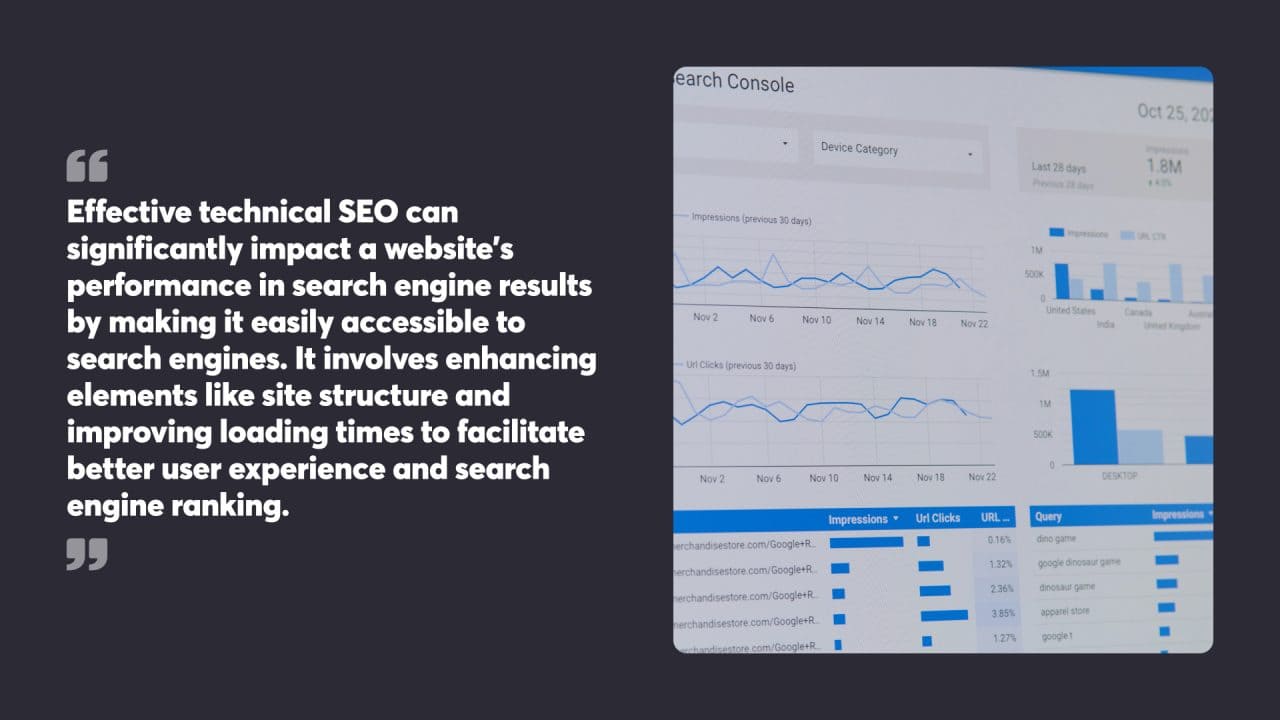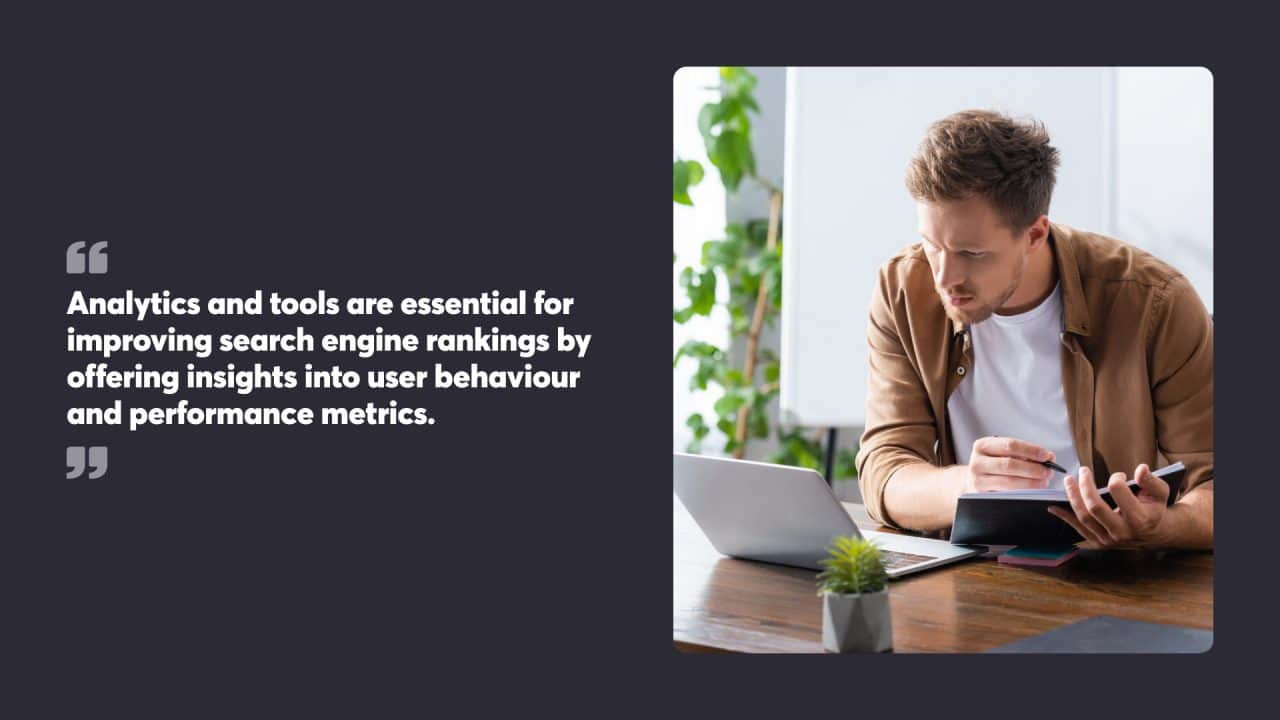
Optimising a website for search engines, commonly known as search engine optimisation (SEO), is an essential component of managing an online presence. This process involves adjusting various elements of your site so that search engines can easily interpret and rank it within the billions of pages of internet content. A fundamental understanding of SEO allows you to improve your website’s position in search results, increasing the likelihood of attracting visitors who are actively looking for the information or services you provide.
A typical SEO strategy encompasses a broad scope of practices, from the selection and use of keywords that reflect what potential customers are searching for, to ensuring that your site is technically structured in a way that search engine algorithms comprehend.
High-quality content creation, strategic link building, and the optimisation of on-page elements also contribute to a well-rounded approach. As the internet becomes more mobile, considerations like optimising for mobile users and understanding the impact of local search on your business listings have likewise become integral to a successful SEO strategy. Utilisation of analytics and SEO tools can provide insights into the performance of your efforts and highlight opportunities for further enhancements.
Key Takeaways
- Holistic SEO Approach: Effective SEO requires a comprehensive strategy that includes keyword research, technical optimisation, high-quality content creation, and strategic link building. Each element plays a crucial role in enhancing a website’s visibility and ranking in search engine results.
- Adaptation to Mobile and Local Trends: As mobile usage and local searches continue to rise, optimising for mobile users and local SEO has become essential. Ensuring your website is mobile-friendly and leveraging local search strategies can significantly improve your online presence and engagement.
- Data-Driven Optimisation: Utilising analytics and SEO tools is vital for understanding user behaviour and site performance. Regularly analysing data from tools like Google Analytics and Google Search Console helps identify opportunities for improvement and ensures your SEO efforts are effectively driving traffic and conversions.

Table of Contents
Understanding SEO
Search engine optimisation (SEO) is a pivotal factor in increasing a website’s visibility. Through effective SEO strategies, a business can improve its organic traffic, drawing more visitors to its website without the need for paid advertising.
The Importance of SEO
SEO has become a critical component for driving website traffic and achieving online success. By optimising a site, businesses can enhance their visibility in search engine results, contributing to higher organic search traffic and, potentially, increasing revenue. An optimised website allows search engines to understand its content better, which, when matched with a user’s search query, can position the site prominently on the search engine results page (SERP). Key benefits include:
- Increased online presence and discoverability.
- Higher organic traffic without reliance on paid advertising.
- Better alignment with user searches, leading to improved user experience and engagement.
- More opportunities for conversion and customer acquisition.
How Search Engines Work
Search engines employ complex algorithms to index and rank web pages. These algorithms consider numerous factors to decode what a web page is about and how it should rank for specific keywords. Below is an overview of how search engines process a website:
- Crawling: Search engines send out ‘crawlers’ or ‘spiders’ to find new and updated content, including web pages, images, videos, and PDFs.
- Indexing: Upon discovery, content is analysed and stored in a vast database – the index. Search engines decode the page’s content and organisational structure.
- Ranking: When a user performs a search, the search engine sifts through the index to provide the most relevant results. A page’s rank can depend on factors like relevance, authority, and user experience.
By understanding how search engines function, SEO specialists can tailor their strategy and tactics towards improving a site’s compatibility with search engine processes, resulting in better search engine visibility.

Keyword Mastery
Effective SEO hinges on understanding which search queries align with the content and goals of a website. Utilising organic search is crucial for growing website traffic by measuring the number of visitors from unpaid search engine results. This involves researching and targeting keywords that are relevant and attainable within a competitive digital landscape.
Performing Keyword Research
Keyword research sets the foundation for SEO by identifying the terms and phrases potential customers are using in Google searches. The process includes assessing the search volume and difficulty of each keyword to forecast its potential to achieve high search rankings. To begin, business owners should establish a list of seed keywords related to their business, products, or services. These seed keywords act as a springboard to discover a broader set of search queries.
Researchers then expand this list by using tools that suggest related terms, also including long-tail keywords which, while searched less frequently, can offer less competition and a higher likelihood of conversion. Analysing current keyword rankings and search results aids in refining the list to those with the best potential for strategic targeting.
Targeting the Right Keywords
After research comes the selection of target keywords, focusing on those with the right balance of search volume and attainability. This selection impacts how well pages perform in search results, determining visibility and traffic. The goal is to find keywords where the website can realistically rank and draw in the intended audience. This involves considering:
- Relevance: Ensuring that keywords are highly relevant to the content.
- Intent: Understanding the user’s purpose behind search queries to align content with needs.
- Competition: Identifying how competing websites perform for desired keywords and whether ranking is achievable.
Keywords should then be strategically placed within website content, titles, meta descriptions, and URLs, ensuring that these elements are optimised to meet Google’s search algorithms. This blend of savvy research and targeted application paves the way for increased organic traffic and improved SEO performance.
Optimising On-Page Elements
Optimising website content requires careful attention to meta descriptions and title tags which play a significant role in search performance.
Crafting Quality Meta Descriptions
A meta description provides a brief summary of a webpage’s content. For successful on-page SEO, create meta descriptions that are informative and concise. They should be around 155 characters to prevent being cut off in search results. Ideally, they will incorporate relevant keywords without keyword stuffing, as this can be counter-productive. Effective meta descriptions are like a short sales pitch for the page, designed to persuade search users that the page contains the information or solution they’re after.
Effective Title Tags and Headings
Title tags are the clickable headlines displayed in search engine results and are vital for usability, SEO, and social sharing. They should be accurate and succinct, ideally within 50-60 characters to avoid truncation. Title tags must align with the content of the page and include primary keywords near the beginning. Meanwhile, headings within the page structure from H1 to H6 also contribute to SEO by organising content for both users and search engines. H1 tags should describe the main topic of the page, while subsequent headings provide structure and highlight key points, using a hierarchy that indicates the most to least important.

Technical SEO Considerations
Effective technical SEO can significantly impact a website’s performance in search engine results by making it easily accessible to search engines. It involves enhancing elements like site structure and improving loading times to facilitate better user experience and search engine ranking.
Site Structure and URL Management
An organised site structure and clear URL management are fundamental for a website’s performance in search engine rankings. They help search engines understand the content hierarchy and facilitate user navigation. An ideal site structure is logical and hierarchical, with a clear indication of the relationship between pages through internal linking.
URL Structure:
- Consistency: Maintain a standard URL structure across the site.
- Readability: URLs should be intelligible and reflect the content of the page.
- Keywords: Include relevant keywords to improve SEO.
Best Practices for Site Structure:
- Clear hierarchy and depth: Limit the number of layers within the site to allow easy access to pages.
- Logical categorisation: Organise content in a way that groups similar topics together.
- Use of breadcrumbs: Helps users and search engines understand the site’s layout.
Improving Site Speed
Page loading speed is a critical component that search engines consider, directly influencing rankings and user satisfaction. A website that loads quickly provides a better user experience and is more likely to retain visitors.
Strategies for Speed Optimisation:
- Compress images: Reduce file sizes to quicken loading times without compromising quality.
- Minimise code: Eliminate unnecessary characters from your website’s coding to speed up processing.
- Implement caching: Store frequently accessed data to reduce load on the server.
Tools for Measuring Site Speed:
- Google PageSpeed Insights: Offers recommendations for speed improvements.
- GTmetrix: Analyses performance and provides actionable feedback.
- WebPageTest: Tests speed under different conditions and locations.

High-Quality Content Creation
High-quality content is a cornerstone of effective SEO and is instrumental in driving more valuable and relevant traffic to a website.
Understanding Content Marketing
Content marketing is a strategic approach that focuses on creating and distributing content that is both relevant and engaging to a defined audience. In the digital environment, content marketing aids search engines in comprehending the subject matter and value of a website, which can lead to better rankings in search results.
To achieve this, content creators must research the interests and needs of their target audience to produce material that addresses those areas. The goal is to provide information that consumers find helpful, which establishes the credibility of the website and fosters trust.
Valuable and Relevant Traffic Through Content
Attracting traffic that is both valuable and relevant is critical for any website. This means visitors are genuinely interested in the products, services, or information the site provides. Content must be crafted to answer the audience’s questions and solve their problems, which encourages engagement and return visits.
Effective use of keywords, based on thorough research, allows content to be discovered by those searching for related topics. This increases the likelihood that the traffic a site receives is composed of individuals more likely to convert into customers or followers.
Building Links Strategically
Effective link-building improves a website’s visibility and SERP rankings. It involves creating internal pathways and fostering connections with external domains.
The Role of Internal Links
Internal links connect various pages within a website, directing users and search engines to additional relevant content. They assist in establishing site architecture and disseminating page authority throughout the site. Strategically linking internally facilitates user engagement by providing a clear pathway to further information. It is critical to use anchor text that is relevant to the page being linked to, enhancing the user experience and helping search engine algorithms understand the context better.
- Correctly placed internal links can lead to longer visit duration.
- Use descriptive anchor text to hint at the linked page’s content.
Acquiring Quality Backlinks
To elevate a website’s authority, it is essential to gain backlinks from reputable external sites. Strategies to acquire such links include creating high-quality content that naturally encourages other websites to link to it, and reaching out for collaborations or guest post opportunities. It’s essential to focus on the relevance and trustworthiness of linking domains.
- Prioritise backlinks from domains with high authority.
- Avoid schemes that might result in artificial or low-quality links.

Mobile Optimisation
Ensuring a website is accessible and efficient for mobile users is fundamental as site ranks can be significantly influenced by mobile usability.
Importance for Mobile Users
The surge in mobile internet usage has amplified the need for websites to cater to mobile users. With an increasing number of searches and website visits coming from mobile devices, a site’s compatibility with mobiles is now a significant factor Google considers when determining rankings. An optimised mobile experience keeps users engaged and reduces bounce rates, which in turn can positively affect a website’s visibility in search results.
Responsive Design
Responsive design refers to a website layout that adapts fluidly to the screen size of various devices. It is essential for providing a consistent and functional user experience across desktops, tablets, and smartphones.
Employing responsive design ensures that content is legible and navigable without the need for constant zooming and scrolling, which can frustrate users and lead to a decline in site visitation. Furthermore, responsive sites are preferred by search engines like Google, which utilise mobile-first indexing to evaluate and rank web content.

Local SEO and Business Listings
Enhancing a business’s online presence within local search results is pivotal for driving physical traffic and online enquiries. Local SEO amplifies visibility for businesses aiming to reach a nearby audience, while effective management of business listings plays a key role in attracting local patrons.
Optimisation for Local Searches
Local search engine optimisation is about making sure a business is prominent in relevant local online searches. Google’s algorithm considers several factors when ranking businesses for localised search queries. Firstly, accurate and complete Google My Business profile listings are vital. Businesses should include their name, address, and phone number consistently across all online platforms.
Secondly, acquiring local backlinks and mentioning locality-specific keywords in online content can significantly influence local search rankings. Reviews also contribute to a business’s local SEO success. Positive reviews enhance credibility and can propel a business’s position in search engine results.
Managing Business Listings
The administration of a local business listing includes maintaining the accuracy and coherence of information across all directories. This includes the business name, location, contact details, and operating hours. It’s crucial to regularly audit and update these details to guarantee consumers find reliable information, helping improve Google rankings.
Businesses should actively engage with their listings, responding to reviews and questions, which demonstrates attentiveness and commitment to customer service. Additionally, utilising high-quality images and providing thorough descriptions of services or products can further attract potential customers to engage with the business.

Utilising Analytics and Tools
Analytics and tools are essential for improving search engine rankings by offering insights into user behaviour and performance metrics.
Integrating Google Analytics
Google Analytics is a fundamental tool that provides data on how visitors interact with a website. By analysing key metrics such as session duration, bounce rate, and pages per session, webmasters can make informed decisions to optimise their site’s performance. Experts recommend setting up goals in Google Analytics to track conversions and understand the effectiveness of content.
Setting Up Google Analytics
- Create a Google Analytics account: Sign up and add the property representing your website.
- Install tracking code: Google provides a unique tracking snippet to insert into your website.
- Set up goals: Configure goals to track desired actions, such as form submissions or purchases.
- Analyse reports: Regularly check various reports to monitor traffic, behaviour, and conversions.
Interpreting Data
- Audience Reports: Understand demographics, interests, and geography of site visitors.
- Acquisition Reports: Find out which channels drive the most traffic.
- Behaviour Reports: Learn which pages retain users and which may require optimisation.
- Conversion Reports: Analyse goal completions and measure ROI.
Leveraging Google Search Console
Google Search Console helps webmasters monitor site health and optimise their website’s visibility. It provides valuable information on search queries that lead users to a site, allowing for optimisation of content strategy to boost search engine rankings.
Utilising Search Console for SEO
- Verify website ownership: Confirm you’re the owner to access data.
- Submit a sitemap: Helps Google understand the structure of your site and index content.
- Monitor search queries: See which keywords your site appears for in search results.
- Check for crawl errors: Identify and fix issues that prevent Google from accessing content.
Improving Site Health
- Address security issues: Google notifies of any security compromises.
- Fix usability problems: Google reports any mobile usability issues found.
- Respond to manual actions: Correct violations that affect your site’s ranking.

Implementing Advanced SEO Strategies
To compete effectively in search engine rankings, websites need to deploy advanced SEO strategies that go beyond the basic on-page elements. These strategies involve a deep understanding of various factors that influence rankings, including the complexities of search intent and the continuous analysis and adaptation to SEO factors.
Understanding Search Intent
Search intent refers to the purpose behind a web user’s search query. It is a critical factor for search engine ranking algorithms, dictating which web pages are most relevant to a user’s search. By aligning a page’s content strategy with user intent, the likelihood of ranking well on search engines is amplified.
- Informational Intent: Users seek knowledge on a topic. Content matching this intent often features comprehensive explanations, guides, or tutorials.
- Navigational Intent: Users aim to locate a specific website or page. To capture this intent, sites should optimise for brand-specific keywords and streamline site navigation.
- Transactional Intent: Users are prepared to purchase or engage in a transaction. Pages catering to this intent should have clear calls to action and streamlined purchase processes.
- Commercial Investigation: Users want to compare products or services before a future transaction. Reviews, comparisons, and best-of articles suit this intent.
Aligning content with search intent is an advanced SEO skill, necessitating research into the keywords and topics correlated with different intents. Sites that successfully match their content with user intent enhance their visibility and utility for their targeted audience.
At Chillybin we keep search engine optimisation front of mind from Day 1 of the design process, and ensure every website we deliver is optimised to help get your business onto Page 1 of Google.
If you have any questions about how SEO could work for your business, please contact us today.




